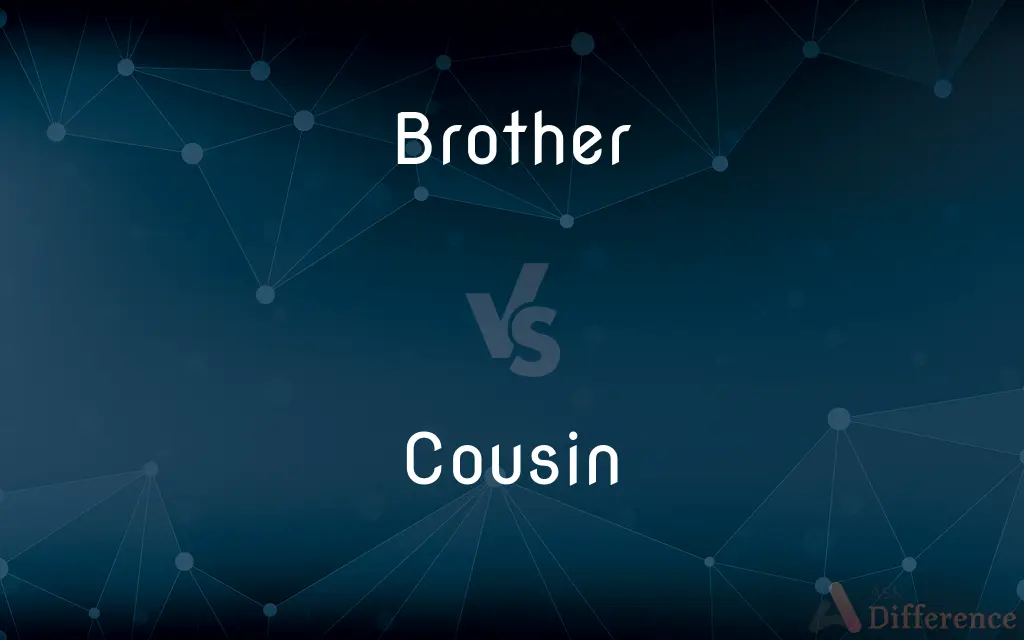Brother vs. Cousin — What's the Difference?
By Tayyaba Rehman — Updated on September 25, 2023
A brother is a male sibling with the same parents, while a cousin is a relative with whom one shares a common grandparent.

Difference Between Brother and Cousin
Table of Contents
ADVERTISEMENT
Key Differences
The term "brother" refers to a male sibling, an individual who shares at least one biological or adoptive parent with another. Brothers are integral to immediate family structures, contributing to the familial bonds and dynamics inherent within a family unit. This relationship usually entails a sense of closeness and shared experiences, with brothers often growing up together, experiencing life stages simultaneously, and sharing a household and upbringing.
In contrast, a "cousin" is a relative descending from a common grandparent, implying a one-generation removal from the immediate family. Cousins might share a familial bond, but this relationship is typically not as close or immediate as that between siblings. Cousins can belong to either the paternal or maternal side of the family and might not share the same level of interaction or shared experiences as siblings, owing to the difference in family branches.
A brother, being a closer relation, often shares a more profound and intimate bond, shaped by shared parents, environment, and experiences. This bond might include mutual support, shared responsibilities, and common upbringing, contributing to a unique and lasting relationship. The connection between brothers is generally characterized by shared values, traditions, and family history, fostering a sense of unity and mutual understanding.
Conversely, a cousin, being a more distant relation, may not share the same intimacy or day-to-day interaction as siblings. The relationship with cousins can vary widely, from being very close to being mere acquaintances, depending on family dynamics, proximity, and individual relationships. Despite being less immediate, the cousin relationship can still be significant, providing an extended support network and a sense of belonging to a wider family circle.
In essence, while a brother is a male sibling, sharing a close and immediate familial bond due to having common parents, a cousin is a relative from either side of the family with whom one shares a common grandparent, representing a more distant familial connection.
ADVERTISEMENT
Comparison Chart
Definition
A male sibling.
A relative with a common grandparent.
Proximity
Immediate family member.
Extended family member.
Shared Relatives
Same parents.
Common grandparent(s).
Familial Bond
Typically closer and more intimate.
May vary from close to acquaintance level.
Shared Experiences
More likely due to shared upbringing.
Less likely due to being in different family branches.
Compare with Definitions
Brother
A male sibling with the same biological or adoptive parents.
My brother and I have shared countless memories together.
Cousin
A child of one's uncle or aunt.
I have a cousin who lives in another country.
Brother
A brother is a man or boy who shares one or more parents with another. The female counterpart is a sister.
Cousin
A relative with whom a person shares one or more common ancestors.
My cousin and I discovered we share a great-grandfather.
Brother
A male having the same parents as another or one parent in common with another.
Cousin
A term used to refer to a person's relative symbolically or in expressions.
She is my cousin, but we are as close as sisters.
Brother
A kinsman.
Cousin
A person belonging to the same extended family.
My cousin will be visiting us next month.
Brother
A fellow man.
Cousin
Someone related by blood or marriage.
We invited all our cousins to the family reunion.
Brother
A fellow member, as of a fraternity, trade union, or panel of judges on a court.
Cousin
Commonly, "cousin" refers to a "first cousin", a relative whose most recent common ancestor with the subject is a grandparent. More generally, in the lineal kinship system used in the English-speaking world, a cousin is a type of familial relationship in which two relatives are two or more familial generations away from their most recent common ancestor.
Brother
A close male friend; a comrade.
Cousin
A child of one's aunt or uncle. Also called first cousin.
Brother
A fellow African American man or boy.
Cousin
A relative descended from a common ancestor, such as a grandparent, by two or more steps in a diverging line.
Brother
Pl. also brethren Something, such as a corporation or institution, that is regarded as a member of a class
“A station that ... relies on corporate contributions or advertising to survive runs the risk of becoming virtually indistinguishable from its commercial brethren” (W. John Moore).
Cousin
A relative by blood or marriage; a kinsman or kinswoman.
Brother
Abbr. Br. or Bro. A lay member of a religious order of men.
Cousin
A member of a kindred group or country
Our Canadian cousins.
Brother
Pl. also brethren A fellow member of the Christian church.
Cousin
Something similar in quality or character
"There's no mistaking soca for its distant Jamaican cousin, reggae" (Michael Saunders).
Brother
Son of the same parents as another person.
Cousin
Used as a form of address by a sovereign in addressing another sovereign or a high-ranking member of the nobility.
Brother
A male having at least one parent in common with another (see half-brother, stepbrother).
Cousin
The child of a person's uncle or aunt; a first cousin.
I think my cousin is a good man.
Brother
A male fellow member of a religious community, church, trades union etc.
Thank you, brother.
I would like to thank the brother who just spoke.
Cousin
(archaic) A kinsman.
Brother
(informal) A form of address to a man.
Listen, brother, I don't know what you want, but I'm not interested.
Cousin
Any relation who is not a direct ancestor or descendant but part of one's extended family; one more distantly related than an uncle, aunt, granduncle, grandaunt, nephew, niece, grandnephew, grandniece, etc.
Brother
(AAVE) A black male.
Cousin
(obsolete) A title formerly given by a king to a nobleman, particularly to those of the council. In English writs, etc., issued by the crown, it signifies any earl.
Brother
Somebody, usually male, connected by a common cause, situation, or affection.
Cousin
(figurative) Something kindred or related to something else.
Brother
Someone who is a peer, whether male or female.
Cousin
A member of the British intelligence services (from an American perspective) or of the American intelligence services (from a British perspective).
Brother
(poetic) Someone who is a kinsman or shares the same patriarch.
Cousin
One collaterally related more remotely than a brother or sister; especially, the son or daughter of an uncle or aunt.
Thou art, great lord, my father's sister's son,A cousin-german to great Priam's seed.
Brother
(transitive) To treat as a brother.
Cousin
A title formerly given by a king to a nobleman, particularly to those of the council. In English writs, etc., issued by the crown, it signifies any earl.
My noble lords and cousins, all, good morrow.
Brother
Expressing exasperation.
We're being forced to work overtime? Oh, brother!
Cousin
Allied; akin.
Brother
A male person who has the same father and mother with another person, or who has one of them only. In the latter case he is more definitely called a half brother, or brother of the half blood.
Two of us in the churchyard lie,My sister and my brother.
Cousin
The child of your aunt or uncle
Brother
One related or closely united to another by some common tie or interest, as of rank, profession, membership in a society, toil, suffering, etc.; - used among judges, clergymen, monks, physicians, lawyers, professors of religion, etc.
We few, we happy few, we band of brothers,For he to-day that sheds his blood with meShall be my brother.
Brother
One who, or that which, resembles another in distinctive qualities or traits of character.
He also that is slothful in his work is brother to him that is a great waster.
That April mornOf this the very brother.
For of whom such massacreMake they but of their brethren, men of men?
Brother
To make a brother of; to call or treat as a brother; to admit to a brotherhood.
Brother
A male with the same parents as someone else;
My brother still lives with our parents
Brother
A male person who is a fellow member (of a fraternity or religion of other group);
None of his brothers would betray him
Brother
A close friend who accompanies his buddies in their activities
Brother
Used as a term of address for those male persons engaged in the same movement;
Greetings, comrade!
Brother
(Roman Catholic Church) a title given to a monk and used as form of address;
A Benedictine Brother
Brother
A man or boy in relation to other sons and daughters of his parents.
He is the youngest brother in his family.
Brother
A close male friend or companion considered as a brother.
He was more like a brother to me than a friend.
Brother
A fellow member or colleague.
He was welcomed by his brothers in the fraternity.
Brother
Used as a form of address to a man.
Can you help me out, brother?
Common Curiosities
Is a cousin considered a distant relative?
Yes, a cousin is generally considered a more distant relative, as they share a common grandparent.
Can the term “brother” also refer to a close male friend?
Yes, the term “brother” can also be used symbolically to refer to a close male friend or companion, denoting a brotherly bond.
Do brothers usually share more common experiences than cousins?
Typically, yes. Brothers, being part of the same nuclear family, usually share more common experiences and upbringing than cousins.
Is a cousin a child of one's uncle or aunt?
Yes, a cousin is typically the child of one's uncle or aunt.
Is a brother an immediate family member?
Yes, a brother is considered an immediate family member, being a male sibling with the same parents.
Do brothers usually have a closer familial bond compared to cousins?
Generally, yes. Brothers usually have a closer and more immediate familial bond due to sharing the same parents and household.
Can brothers have different levels of closeness and intimacy in their relationship?
Absolutely. While brothers typically share a close familial bond, the levels of closeness and intimacy in their relationships can vary widely based on individual dynamics, experiences, and personalities.
Is it common for cousins to have less day-to-day interaction compared to brothers?
Yes, it’s common for cousins to have less day-to-day interaction compared to brothers, as they are part of different nuclear families and may not share the same household or proximity.
Can the relationship with cousins vary in closeness?
Absolutely. Relationships with cousins can vary widely, ranging from very close to mere acquaintances, depending on individual family dynamics and proximity.
Can the term “brother” refer to a fellow member of a group or organization?
Yes, the term “brother” can refer to a fellow member or colleague in a group, organization, or fraternity, indicating a sense of camaraderie and shared purpose.
Can the term “cousin” be used symbolically?
Yes, the term “cousin” can be used symbolically to refer to someone related by blood or marriage, or to denote a relationship of family-like closeness.
Can the term “brother” be used as a form of address?
Yes, the term “brother” can be used as a form of address to a man, often indicating a sense of solidarity or camaraderie.
Do cousins share common ancestors?
Yes, cousins share common ancestors, typically a set of grandparents.
Share Your Discovery

Previous Comparison
Bloom vs. Vigor
Next Comparison
Diner vs. RestaurantAuthor Spotlight
Written by
Tayyaba RehmanTayyaba Rehman is a distinguished writer, currently serving as a primary contributor to askdifference.com. As a researcher in semantics and etymology, Tayyaba's passion for the complexity of languages and their distinctions has found a perfect home on the platform. Tayyaba delves into the intricacies of language, distinguishing between commonly confused words and phrases, thereby providing clarity for readers worldwide.














































